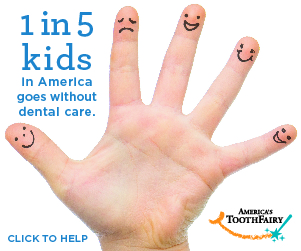Non-Profit and Charitable Dental Organizations

Researching and evaluating what can be an overwhelming slew of dental coverage and assistance options can be a seemingly insurmountable task. You can spend many frustrating and fruitless hours sifting through the vast amount of information without finding what you need.
To help orient and target your search, we have listed some resources – divided by demographic served – that may prove useful.
For Children:
The National Children’s Oral Health Foundation plans to build more than 500 centers, treat more than five million children and educate 20 million people over the next 10 years. It serves as a comprehensive resource provider for not-for-profit pediatric oral health facilities, which deliver critical preventive, educational and treatment services. www.ncohf.org or 1-800-559-9838
Oral Health America’s Smiles Across America program, operating in Chicago, Las Vegas, Minneapolis/St. Paul, Santa Barbara/Ventura Counties (California) and Maine, provides oral health programs through school-linked programs. www.oralhealthamerica.org/smiles.html
The Children’s Dental Health Project helps policymakers, healthcare providers, healthcare advocates and parents improve children’s oral health and increase their access to dental care. www.cdhp.org
Ronald McDonald House Charities help locate treatment for special cases, connecting such patients (children and their families) with dentists and oral surgeons. www.rmhc.com
Oral Health America’s National Sealant Alliance is committed to sealing one million teeth for approximately 225,000 children by 2010 by providing donated dental sealant material to school-based and school-linked programs throughout the United States. www.oralhealthamerica.org
For the Needy and Underprivileged:
The Chicago Dental Society has assistance projects that build educational institutions and public health programs to support the dental profession and provide dental care to the needy. www.cds.org or (312) 836-7300
The Centers for Disease Control’s National Oral Health Surveillance System provides information about early childhood-oriented programs such as the Special Supplemental Nutrition Program for Women, Infants, and Children (WIC), Head Start, childcare centers and family resource centers. www.cdc.gov/nohss/
The Health Resources and Services Administration (HRSA) Bureau of Primary Care offers information about federally qualified community, migrant and homeless health centers. Federally funded healthcare centers provide you with health treatments, even if you have no health insurance. You pay what you can afford, based on your income. Search by state or county to find health centers that provide dental care, as well as health checkups, treatments, pregnancy care and prescription drugs for you and your family.
Certain universities, such as the University of Minnesota Dental School, Berkeley University and Marquette University, provide free or low-cost dental care. For instance, the UAB School of Dentistry in Birmingham, Alabama, offers seniors and anyone who is without teeth (edentulous), services such as the “2–2–2” implant program (two implants, two dentures and two implant abutments) for $975. www.dental.uab.edu or (205) 934-3000.
For the Disabled:
The National Foundation of Dentistry for the Handicapped, a charitable affiliate of the American Dental Association, collaborates with other groups to arrange comprehensive dental treatment and long-term preventive services to needy disabled, elderly or medically compromised individuals through a national network of direct service programs comprised of more than 12,900 volunteer dentists and 2,700 volunteer laboratories. www.nfdh.org
 Special Care Dentistry Association (SCDA)
Special Care Dentistry Association (SCDA)
The Special Care Dentistry Association is a unique international organization dedicated to the promotion of oral health and general wellbeing for people with special needs. The not-for-proft organization is comprised of dental professionals from the American Association of Hospital Dentists (AAHD), the Academy of Dentistry for Persons with Disabilities (ADPD) and the American Society for Geriatric Dentistry, as well as non-dental healthcare providers, health program administrators, residents, students and hospitals.
The SCDA provides educational opportunities for oral health care professionals by encouraging practitioners to build on credentials through fellowship programs and the Diplomate Certification Program. The SCDA also advocates for national legislation helping to shape dental residency education, practice guidelines and institutional protocols designed to assist in providing oral health care services.
Get more information about the Special Care Dentistry Association.
Dental Coverage for the Unemployed and Uninsured:
The Foundation for Health Coverage Education’s website offers resources that can connect you with government programs in your state. The application and enrollment database provides state-by-state applications to sign up for private and public health coverage. Some programs have applications you can print and some have links to websites where you can apply or get a quote.www.coverageforall.org or (800) 234-1317.



